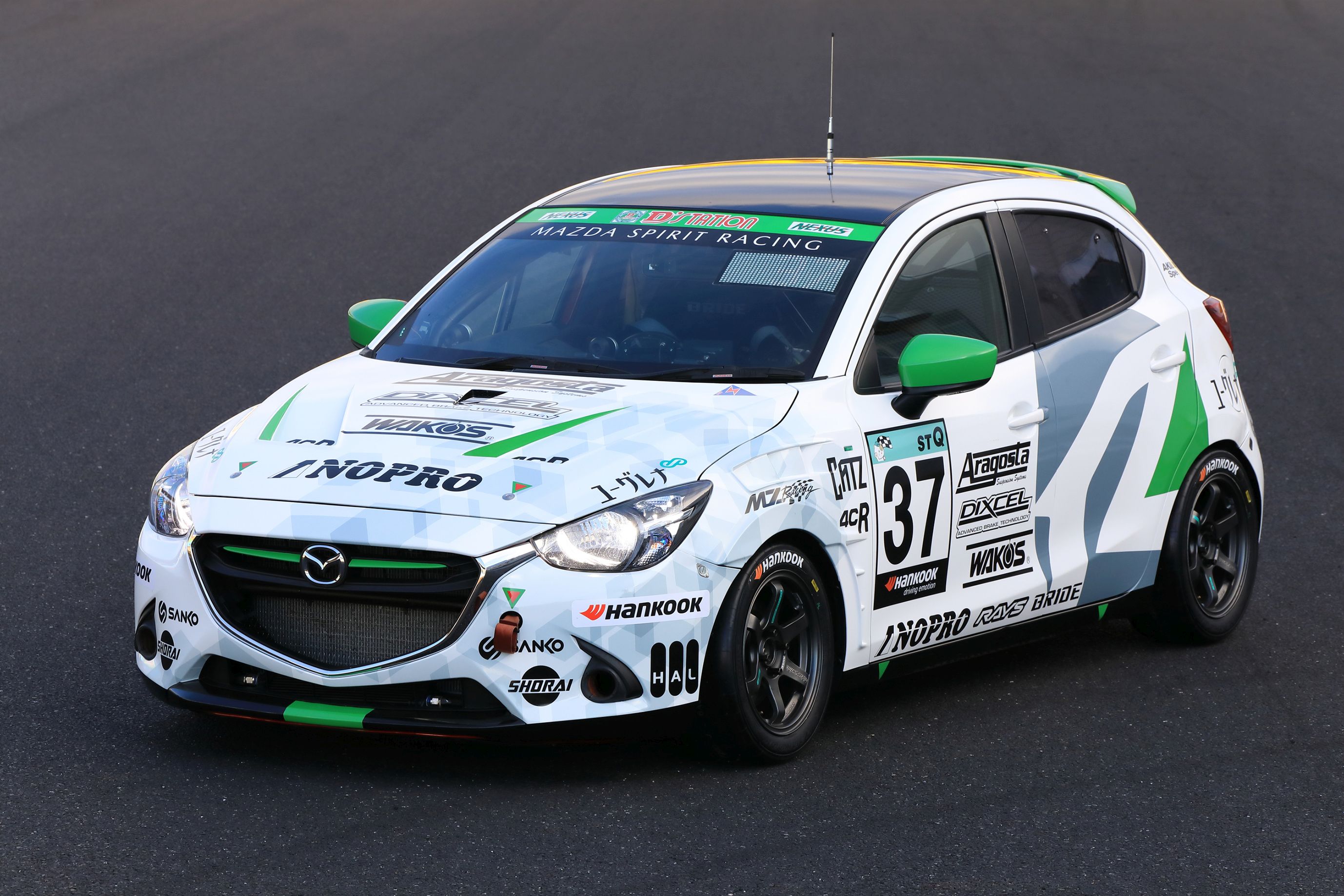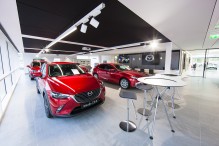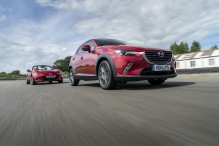As part of its continued commitment to achieving carbon neutrality, the Mazda Motor Corporation participated in the final round of the 2021 Super Taikyu race series held at the Okayama International Circuit last weekend. The Super Taikyu Series is a domestic Japanese multi-class endurance racing championship that features nine classes ranging from GT3, GT4 and TCR race cars to six classes of modified production cars.
Alongside the NOPRO3 racing team, Mazda entered a 1.5-litre Skyactiv-D Mazda Demio in the ST-Q class – a non-championship category introduced for the purpose of showcasing experimental vehicles and new technology. Entered as ‘Mazda Spirit Racing Bio concept by Demio’ the ST-Q Demio (Mazda2) run on 100% bio-based fuel made from used cooking oil and microalgae fats. From next year, Mazda will participate in all rounds of the championship.
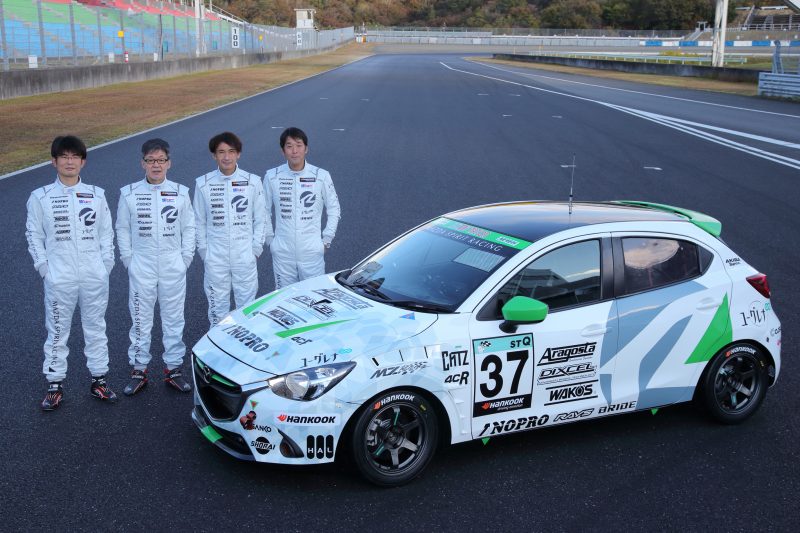
To achieve carbon neutrality, Mazda believes it is important to offer customers a variety of options. With this in mind, Mazda intends to expand its powertrain lineup by investing not only in conventional hybrids, diesel engine models, and EV models but also plug-in hybrid models while promoting initiatives in renewable fuels such as next-generation biodiesel fuels.
Next-generation biodiesel fuels, which are made from sustainable raw materials such as microalgae fats and used cooking oil, do not compete with the human food supply, which has been an issue with existing biodiesel fuels. As these fuels can also be used as alternatives to diesel fuel in existing vehicles and equipment without any modification, no additional fuel supply infrastructure is required. Therefore, biodiesel fuels can be expected to play a prominent role as an excellent liquid fuel source in promoting carbon neutrality.
Mazda is a member of the Hiroshima “Your Green Fuel” Project, an initiative running in Hiroshima for popularizing and spreading the use of next-generation biofuels jointly run by the Hiroshima Council for Automotive Industry-Academia-Government Collaboration (Hirojiren)1 and Euglena Co., Ltd.2. The project aims to establish a model for revitalizing regional areas by retaining the entire value chain of carbon neutral fuels from the manufacture and supply of raw materials through to fuel use within the Hiroshima area.
In August 2020, the project confirmed that the performance of this biodiesel fuel was on a par with petroleum-based diesel fuel, and Mazda commenced using it in company cars with diesel engines.
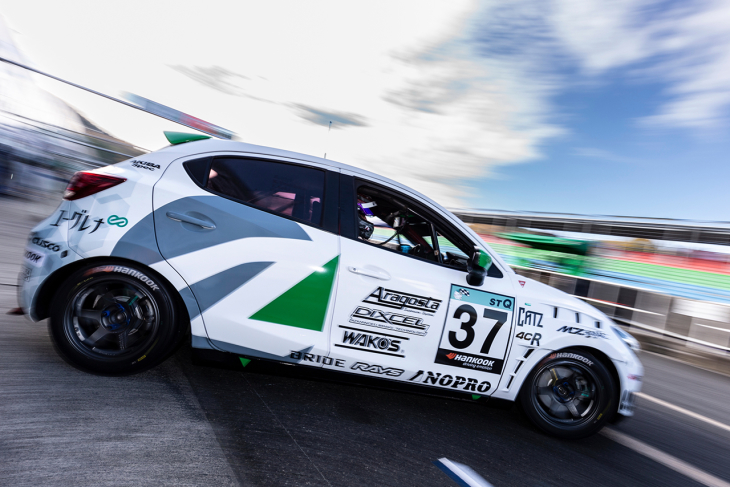
The Skyactiv-D 1.5 engine, installed in the Mazda Demio that competed in the 94 lap Super Taikyu Race on Sunday, demonstrated peak performance when running on next-generation biodiesel fuel without any engine modifications. In a demonstration test of a next-generation biodiesel fuel derived entirely from biomaterials, the racecar was powered by a biofuel called “Susteo” supplied by Euglena. The plan is to use fuel from Euglena for the next season as well with a Mazda entered continued to be entered in the SQ-5 class for experimental cars developed by manufacturers and approved by the Super Taikyu Organising Committee.
Last weekend, Kawasaki Heavy Industries, Subaru, Toyota, Mazda and Yamaha jointly announced a challenge to expand fuel options in combination with internal combustion engines at the Super Taikyu Race. Specifically, to further expand options for producing, transporting, and using fuel, the five companies intend to unite and pursue the three initiatives of 1) participating in races using carbon-neutral fuels, 2) exploring the use of hydrogen engines in two-wheeled and other vehicles, and 3) continuing to race using hydrogen engines.
As part of its continued commitment to achieving carbon neutrality, the Mazda Motor Corporation participated in the final round of the 2021 Super Taikyu race series held at the Okayama International Circuit last weekend. The Super Taikyu Series is a domestic Japanese multi-class endurance racing championship that features nine classes ranging from GT3, GT4 and TCR race cars to six classes of modified production cars.
Alongside the NOPRO3 racing team, Mazda entered a 1.5-litre Skyactiv-D Mazda Demio in the ST-Q class – a non-championship category introduced for the purpose of showcasing experimental vehicles and new technology. Entered as ‘Mazda Spirit Racing Bio concept by Demio’ the ST-Q Demio (Mazda2) run on 100% bio-based fuel made from used cooking oil and microalgae fats. From next year, Mazda will participate in all rounds of the championship.
To achieve carbon neutrality, Mazda believes it is important to offer customers a variety of options. With this in mind, Mazda intends to expand its powertrain lineup by investing not only in conventional hybrids, diesel engine models, and EV models but also plug-in hybrid models while promoting initiatives in renewable fuels such as next-generation biodiesel fuels.
Next-generation biodiesel fuels, which are made from sustainable raw materials such as microalgae fats and used cooking oil, do not compete with the human food supply, which has been an issue with existing biodiesel fuels. As these fuels can also be used as alternatives to diesel fuel in existing vehicles and equipment without any modification, no additional fuel supply infrastructure is required. Therefore, biodiesel fuels can be expected to play a prominent role as an excellent liquid fuel source in promoting carbon neutrality.
Mazda is a member of the Hiroshima “Your Green Fuel” Project, an initiative running in Hiroshima for popularizing and spreading the use of next-generation biofuels jointly run by the Hiroshima Council for Automotive Industry-Academia-Government Collaboration (Hirojiren)1 and Euglena Co., Ltd.2. The project aims to establish a model for revitalizing regional areas by retaining the entire value chain of carbon neutral fuels from the manufacture and supply of raw materials through to fuel use within the Hiroshima area.
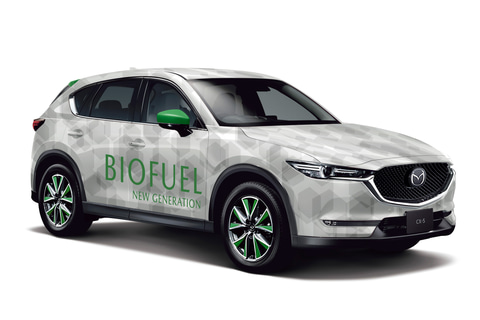
In August 2020, the project confirmed that the performance of this biodiesel fuel was on a par with petroleum-based diesel fuel, and Mazda commenced using it in company cars with diesel engines.
The Skyactiv-D 1.5 engine, installed in the Mazda Demio that competed in the 94 lap Super Taikyu Race on Sunday, demonstrated peak performance when running on next-generation biodiesel fuel without any engine modifications. In a demonstration test of a next-generation biodiesel fuel derived entirely from biomaterials, the racecar was powered by a biofuel called “Susteo” supplied by Euglena. The plan is to use fuel from Euglena for the next season as well with a Mazda entered continued to be entered in the SQ-5 class for experimental cars developed by manufacturers and approved by the Super Taikyu Organising Committee.
Last weekend, Kawasaki Heavy Industries, Subaru, Toyota, Mazda and Yamaha jointly announced a challenge to expand fuel options in combination with internal combustion engines at the Super Taikyu Race. Specifically, to further expand options for producing, transporting, and using fuel, the five companies intend to unite and pursue the three initiatives of 1) participating in races using carbon-neutral fuels, 2) exploring the use of hydrogen engines in two-wheeled and other vehicles, and 3) continuing to race using hydrogen engines.
As part of its continued commitment to achieving carbon neutrality, the Mazda Motor Corporation participated in the final round of the 2021 Super Taikyu race series held at the Okayama International Circuit last weekend. The Super Taikyu Series is a domestic Japanese multi-class endurance racing championship that features nine classes ranging from GT3, GT4 and TCR race cars to six classes of modified production cars.
Alongside the NOPRO3 racing team, Mazda entered a 1.5-litre Skyactiv-D Mazda Demio in the ST-Q class – a non-championship category introduced for the purpose of showcasing experimental vehicles and new technology. Entered as ‘Mazda Spirit Racing Bio concept by Demio’ the ST-Q Demio (Mazda2) run on 100% bio-based fuel made from used cooking oil and microalgae fats. From next year, Mazda will participate in all rounds of the championship.
To achieve carbon neutrality, Mazda believes it is important to offer customers a variety of options. With this in mind, Mazda intends to expand its powertrain lineup by investing not only in conventional hybrids, diesel engine models, and EV models but also plug-in hybrid models while promoting initiatives in renewable fuels such as next-generation biodiesel fuels.
Next-generation biodiesel fuels, which are made from sustainable raw materials such as microalgae fats and used cooking oil, do not compete with the human food supply, which has been an issue with existing biodiesel fuels. As these fuels can also be used as alternatives to diesel fuel in existing vehicles and equipment without any modification, no additional fuel supply infrastructure is required. Therefore, biodiesel fuels can be expected to play a prominent role as an excellent liquid fuel source in promoting carbon neutrality.
Mazda is a member of the Hiroshima “Your Green Fuel” Project, an initiative running in Hiroshima for popularizing and spreading the use of next-generation biofuels jointly run by the Hiroshima Council for Automotive Industry-Academia-Government Collaboration (Hirojiren)1 and Euglena Co., Ltd.2. The project aims to establish a model for revitalizing regional areas by retaining the entire value chain of carbon neutral fuels from the manufacture and supply of raw materials through to fuel use within the Hiroshima area.
In August 2020, the project confirmed that the performance of this biodiesel fuel was on a par with petroleum-based diesel fuel, and Mazda commenced using it in company cars with diesel engines.
The Skyactiv-D 1.5 engine, installed in the Mazda Demio that competed in the 94 lap Super Taikyu Race on Sunday, demonstrated peak performance when running on next-generation biodiesel fuel without any engine modifications. In a demonstration test of a next-generation biodiesel fuel derived entirely from biomaterials, the racecar was powered by a biofuel called “Susteo” supplied by Euglena. The plan is to use fuel from Euglena for the next season as well with a Mazda entered continued to be entered in the SQ-5 class for experimental cars developed by manufacturers and approved by the Super Taikyu Organising Committee.
Last weekend, Kawasaki Heavy Industries, Subaru, Toyota, Mazda and Yamaha jointly announced a challenge to expand fuel options in combination with internal combustion engines at the Super Taikyu Race. Specifically, to further expand options for producing, transporting, and using fuel, the five companies intend to unite and pursue the three initiatives of 1) participating in races using carbon-neutral fuels, 2) exploring the use of hydrogen engines in two-wheeled and other vehicles, and 3) continuing to race using hydrogen engines.
– Ends –
3 A racing team (Nogami Project Co.,Ltd., Representative: Toshihiko Nogami) that has been participating in the Super Taikyu Race since 2015 with Demio (Skyactiv-D 1.5)

